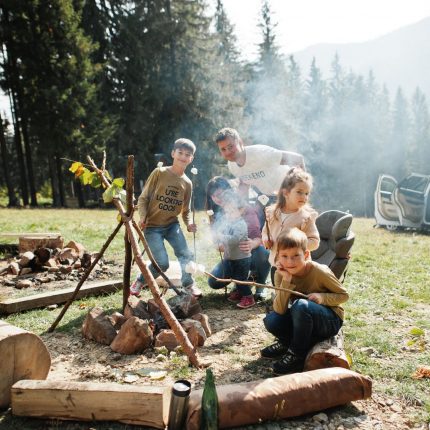
Using the Summertime to Build Background Knowledge
July 25, 2023This post is sponsored by Time4Learning.com
Imagine you are a third-grader, living your whole life in a high-rise apartment building in New York City. For school, you are asked to read Charlotte’s Web by E.B. White. You have never seen a farm. You read the descriptions, but they are just words. You cannot make connections to what you know because you have never seen barns, silos, and farm animals. While you may still enjoy the book, and it is building background knowledge for you, your initial understanding of the story may be limited.
In her book, Overcoming Textbook Fatigue, ReLeah Cossett Lent calls background knowledge “the glue that makes learning stick.” She claims that “not taking the time to assess, activate, and build prior knowledge is like throwing the ball to an inexperienced basketball player and demanding that he play like a pro in the big game.” Summer—when you may not be formally schooling—can be a great time to help your children build such prior, or background, knowledge, and you can do it in ways that fit with your summer fun plans.
Talk! Talk! Talk!
During the summer, you may have more time to just relax and talk with your family. Tell stories about your own experiences—maybe bring out some old pictures! Provide time for your children to speak with older generations to learn about the family’s heritage and their own experiences. Take advantage of the extra time in the summer to have more in-depth conversations during barbecues and picnics, or while sitting at the pool, beach, or even on the front lawn or porch.
In your daily interactions with your children, remember to keep talking! Sometimes, we get so busy with what we have to do that we forget that our children may not know everything (even if they act like they do!). Show them how to cook or fix the brakes on the car; talk about driving while you do it, or explain parts of your finances (i.e., what a mortgage is or how to earn interest on your money) when you pay your bills. Ask if they know what certain words mean or where a movie is taking place. Challenge yourself to find “teachable moments.”
Enjoy New Experiences
Obviously, one of the best ways to gain background knowledge is to travel. The amount of information your children can learn from a summer family vacation to another city/town, state, or country is limitless. Your children can discover the ways different people live, and learn about their foods, languages, and customs while investigating new landscapes and wildlife. Bring a map (in the car, plane, etc.) wherever you go so that your children’s sense of the world’s geography can grow and grow.
state, or country is limitless. Your children can discover the ways different people live, and learn about their foods, languages, and customs while investigating new landscapes and wildlife. Bring a map (in the car, plane, etc.) wherever you go so that your children’s sense of the world’s geography can grow and grow.
However, building your children’s background knowledge does not require expensive and elaborate vacations. You can enjoy new experiences locally as well. Find something interesting about your community, do some research, and then explore. For example, perhaps there is a building on the historic registry in your town or a local waterway you can investigate. Check out town web pages for local gems to discover!
Explore Imaginary and Virtual Experiences
If, for whatever reason, you find yourself more at home during the summer, don’t worry, there are still plenty of ways that you can broaden your children’s background knowledge. Providing books, magazines, and other texts—even picture books—can expand your children’s knowledge of the world. Sit under a tree and enjoy the summer weather while exposing your children to new and exciting places, different ways of life, and fascinating wonders of the world in fun ways.
With younger children, or children who are not so eager to read, showing images, short videos, or full-length movies will also work. Take advantage of rainy days to explore the world virtually through documentaries or online tours. More and more museums and other attractions are offering virtual tours with accompanying materials. Enjoy a virtual experience with your family and learn together when you cannot visit in person.
Encourage Questioning
Another important way to build background knowledge, especially during informal summer learning, is by encouraging your children to ask questions. Model this by posing questions yourself and then researching answers. Check-in with your children to see if they can ask a question during a hike in the woods or a day in the yard, and then find out the answer once the sun has gone down and activities have moved inside.
Some good typical classrooms have question boards where kids can add questions on sticky notes whenever they think of them. Why not try a question board in your home? Consider addressing a “question of the day” before you go out for your summer activities, or even try building some summer activities around your children’s questions. Be creative!
Regardless of your method of building these connections, whatever you do to expand on what is familiar will help your children when they read, write, listen, or speak in and out of school. Being aware of the need to grow background knowledge will help you as a homeschooler take advantage of the world’s classroom. Who knows? You may be enlightened in the process!
Additional Homeschool Resources
How to Avoid the Summer Learning Slide
Seven Reasons to Keep Learning This Summer
101 Fun Things to Do This Summer
Latest Posts

As homeschooling continues to grow in popularity, more parents are taking on the challenge of providing a comprehensive education that not only meets academic standards but also prepares their…
Read more >
June has come and gone, and summer is in full swing! Whether you're traveling this summer or staying close to home, we hope you're enjoying this time with your family. We wanted this month's…
Read more >
Summer is an all-around favorite season for most people. In the U.S., it’s even more exciting for many of us since we get to celebrate Independence Day! The Fourth of July is a wonderful…
Read more >

